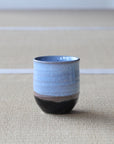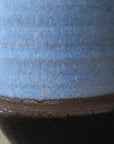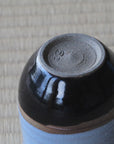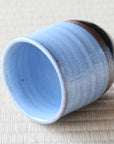



ASAHIYAKI Tea Cup Two Tone Color 170ml
ASAHIYAKI Tea Cup Two Tone Color 170ml, crafted by 16th generation pottery maker Matsubayashi Hosai.
Two-tone tea cup with Geppaku glaze and black glaze. Firing in the climbing kiln "Genyo". Perfect to drink Japanese tea. Geppaku and Black glaze that color beautifully in the high temperature area of the climbing kiln. You can see the scorched look of the soil between blue and black.
ASAHIYAKI, founded over 400 years ago in the Uji region of Kyoto Prefecture in Japan and now operated by 16th generation pottery maker Matsubayashi Hosai.
Its earliest working-kiln was constructed about four hundred years ago, on the cusp of the shift from the Momoyama (c. 1585-1605) to the Edo Period (c. 1605-1867), by the first-generation kiln-master, Tosaku I. During this era, the supremely-influential Tea-master Sen-no-Rikyu (1522-91) brought to perfection the tea ceremony, and his later successor, Kobori Enshu (1579-1647), began to make his first youthful but noted appearances in Tea-circles. He established an enduring relation with the increasingly-productive Tea-growers of the Uji area, and contributed significantly to establishing the Uji tea as the nation’s first choice for green tea. It was Enshu who officially bestowed on Tosaku I the kiln-soubriquet ‘Asahi’. And this is why Asahiyaki has traditionally been numbered among the ‘seven Enshu kilns’ [Enshu nanagama].
The Asahiyaki kiln still carefully maintains its dual tradition of creating both ware for the Rite of Tea, as first undertaken by Tosaku I, and also utensils with which to savor infusions from fine green leaf-tea (sencha).
Master ceramist Matsubayashi Hosai's work is, in addition to the traditional Asahiyaki Kase(fawn back) and Red Kase(red fawn back), also producing in the style of the 16th generation with a modern atmosphere, Geppaku overglazed works.
- ASAHIYAKI Tea Cup 170ml
- Two Tone Color
- Size diameter: 68x80mm
- Made from local clay (aged 100+ years)
- Geppaku glaze (Black glaze)
- Genyo firing kiln used
- Handmade in Uji, Kyoto, Japan



